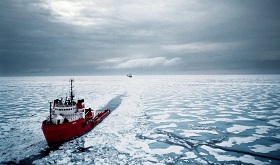The Arctic region remains a frozen treasure that everybody wants to lay hands on. In Russia, when we speak about the Arctic region, we mean oil exploitation. The scope of the discussion should be broader and more focused on painful issues like climate change, preserving natural habitats and keeping indigenous people safe and sound. How long will we be blind to these problems? Professor Vincent F.Gallucci, director for the Centre for Canadian Arctic studies at the University of Washington in Seattle, Fishery’s science and policy expert shares his views with RIAC.
The Arctic region remains a frozen treasure that everybody wants to lay hands on. In Russia, when we speak about the Arctic region, we mean oil exploitation. The scope of the discussion should be broader and more focused on painful issues like climate change, preserving natural habitats and keeping indigenous people safe and sound. How long will we be blind to these problems? Professor Vincent F.Gallucci, director for the Centre for Canadian Arctic studies at the University of Washington in Seattle, Fishery’s science and policy expert shares his views with RIAC.
In April 2015 the chairmanship of the Arctic Council goes to the USA. What are the main difficulties the U.S. is likely to face? How does the USA account for the climate change program in the Arctic region?
The U.S. views climate change as a major problem both in the Arctic and outside it. It is true that the U.S. has not participated in Arctic issues as much as it could have because the U.S. Congress has not ratified the Law of the Sea. The Law of the Sea is the real structure in which the Arctic council is embedded, at least for marine issues. Terrestrial and inland issues are quite different. Nevertheless, climate change is what is making the Law of the Sea even more important every day.
There is concern that in a comparative sense, the U.S. has a relatively small part of the Arctic. It is not inside the Arctic Ocean, as are Canada and Russia. As the chair of the council, the U.S. will have responsibility for the whole Arctic circumpolar community. For America itself, as one nation, one area of concern is going to be the Bering Strait. The Bering Strait is a relatively narrow body of water that separates our two countries. I think that the Strait will not be able to sustain the vessel traffic that will eventually want to go between the Atlantic and Pacific Oceans. In fact, you are not in the Pacific Ocean even after you’ve passed through the Bering Strait, going west. You are then in the Bering Sea which is a huge sea of the North Pacific. So, I think this is going to be one issue both the U.S. and Russia would be interested in discussing with both Arctic and non-Arctic nations.
Climate change is going to be on the U.S. agenda. A growing problem not only in the U.S. but also in Canada is a collapsing of indigenous people’s villages, economies, livelihoods. There are already significant environmental effects. The polar bears, the walruses – a lot of these animals will die because their food chains would be interrupted. A lot of animals are going to be experiencing risks of extinction. We are seeing differences in polar bears already taking place: they are much thinner and mothers are having smaller numbers of cubs.
So, these things will be of interest because they are a major concern for American people and of vital importance for indigenous people. I think that Admiral Robert J. Papp, who is going to be the new chair of the Arctic Council, will be very interested in continued good interactions with the Russians. It’s my opinion that there are more similarities in Russian and American interests than there are differences, especially in the Arctic. For example, neither country wants the Arctic Council or any organization to be able to tell them what to do or not to do.
Chairmanship of the Arctic Council is being transferred from Canada to the U.S. During Canada's time as chair the number of permanent observers was greatly expanded to include four Asian countries. This expansion in the number of non-Arctic countries has the potential to significantly change how the Council operates in the future. It is possible that similar Council shaping decisions will come under U.S. chairmanship.
How do you see current Russian-American Arctic cooperation?
The U.S. and Russia have a lot of common matters to settle and to regulate in the Arctic region. Within the Arctic bilateral cooperation will not be greatly affected by other problems and conflicts taking place outside the region in question. Nevertheless, a possible obstacle to strong bilateral cooperation is that Russian attention will be deflected from the Arctic to their European border because of the Ukrainian situation. The Arctic cooperation might then slow down. In many ways that is why I am here - I want our cooperation to continue. I think we may have to work at it with a little more effort than we would have in the past. We can only hope that all will go well between our countries because there is so much at stake for the Arctic and because there is too much interest in cooperation.
Earlier you have touched upon the traffic in the Arctic region. What are the main infrastructure projects this year in terms of transport and the Northern Sea Route? What role will Asian countries, like China, play in building these routes?
You are not asking a simple question. There is practically no real infrastructure along the Northern Sea Route. So, if there’s an emergency on board of a ship. If a gigantic ship, over one hundred meters long, loses rudder control, it would be days if not weeks before a repair could be done. At present any non-Russian vessel has to have a Russian icebreaker accompany it which might help with repair but more likely with rescue. Alternatively, how about asking the Chinese to build small communities along the Sea Route? Some say it would be a terrible idea while others are advocates.
Why?
Essentially, it is politics. Allowing another country, in this case, China, to establish bases in their territory by building the essential infrastructure will in some senses make that country an intermediary in the host country. Russia may not even be able to find a “banya” since the signs will be in Chinese. More seriously, China has not earned a very positive international reputation based on the development projects that they have carried out in various African countries. In many cases, the African country thought that they would benefit by employment of their people in construction and operation of some facility. But, in reality Chinese laborers were imported to build and then depart leaving a few to operate a facility. On the other hand, in the Russian Arctic this may be balanced by the advantages of rapid construction, and the possible addition of a new demographic group who may remain, especially if the Russians do not want to migrate to inhabit these new communities. Of course, China would want payment for this effort, which may come in the form of some sort of oil/gas exchange agreement, not requiring the transfer of Russian currency. In my opinion, it is potentially a good arrangement for Russia, especially at a time when resources for the Arctic are scarce since they must compete with the resource needs on Russia’s European border, thanks to her involvement in Ukraine. In all, I would call such a Russo-Chinese agreement a “calculated long term risk”.
While discussing infrastructure, may I return for a moment to Bering Strait? I am suggesting that Russia consider the limitations of the Bering Strait and consider building on what already exists in Chukotka. The Bering Strait is as narrow as 45 miles between the Russian and U.S. main lands, with islands and rocks in this passageway. Simply put, it is bad waterway to pass oil carrying and cargo ships between the Arctic and Pacific Oceans. This is especially true since this strait is dangerously shallow in places and has some of the worst weather and currents to be found in the Arctic which these vessels would have to pass through. I am suggesting that Russia give consideration to enhancing the infrastructure from Chukotka to more southerly Russian ports or even directly to China, perhaps via a rail link.
Interviewed by Maria Gurova, RIAC web-editor






